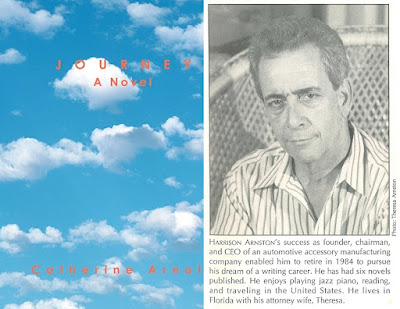|
Journey by
Catherine Arnold (Harrison Arnston?) iUniverse, 2003 In the early-1990s my parents sprang for a subscription to
the bulletin board service Prodigy. Prodigy was a predecessor to
AOL and (ultimately)
to the commercialized internet we have today. Basically, Prodigy was a
bunch of bulletin boards where people with similar interests gathered to chat
about what made them excited. I tended to spend my time—or perhaps misspend
my time—on boards about books and baseball. One of the boards I frequented
was called Harry’s Bar & Grill. Its operator was a thriller writer
named Harrison Arnston. He went by Harry in both the real and digital worlds,
but his novels were published as “Harrison”. Harry was a renaissance man—cool,
successful, and kind. His board was about writing and he knew what he was
talking about. When I first met Harry—the digital version anyway—he had
published four novels; all paperback originals released by Zebra. In 1984, Harry
had sold his successful California “auto-accessory company,” moved to Palm
Harbor, Florida, and set out to write thrillers. It didn’t come easy, either.
After reading his first thriller, which was never published, one agent told
him to find another hobby. But Harry wrote another and then another before he
found print with Zebra. Harry was the first “real”
writer that took an interest in me, or at least made me feel like he did, and
I loved every piece of advice he gave me and anyone else that wandered into Harry’s
Bar & Grill. In the early-1990s, HarperPaperbacks became Harry’s
publisher and the quality if his work noticeably improved. Jon L. Breen noted
that Harry’s legal thriller, Act of Passion (1991), was “unusually
well plotted” and every book Harry wrote was better than the last. Harry’s
journey ended prematurely in 1996, he was 59, after a brief battle with lung
cancer, but I’ve always wondered what he would have produced if he hadn’t
died. My point? I think I found Harrison
Arnston’s final novel. It was self-published by Arnston’s widow, Theresa
Sandford-Arnston, using her pseudonym, Catherine Arnold, with the title, Journey.
Unfortunately, Ms. Arnston died in 2016 and so I can’t ask her. I haven’t
been able to make contact with any of his or her family, either. And I’ve
tried. But after reading Journey—which is a cool take on an X-Files
theme—I’m convinced it was written by Harry Arnston because it is
stylistically similar to his last few published novels. Another clue, and it
is a big one, comes from Harry’s St. Petersburg Times obituary (Feb.
4, 1996) stating his agent was peddling a novel titled Journey. My only hesitation about Journey
belonging to Harry Arnston is, back in 2008 I exchanged emails—at least three
or four—with Theresa Arnston about Harry and she said his only unpublished
book was a thriller titled American Terrorist. Journey had been
published five years earlier, but I’m puzzled why she wouldn’t have told me
about Journey. Now, a
little about Journey. It was obviously written in the mid-1990s
because it mentions the first World Trade Center bombing and the Waco siege (both
in 1993), and the Oklahoma City bombing in 1995, but nothing significant
after that. There are a few add-ins, a line here or there that feel like they
were dropped in by another writer and don’t exactly fit the overall context.
One such add-in is a mention of the 2002 film, The Hours. Journey
has that big 1990s thriller feel, too—weighty problems, significant
background detail, lightweight characterization, but still richer than most
current genre thrillers, and a quality of we can do it hopefulness
that we seemed to lose after 9/11. Everything begins when a 747
disappears from an air traffic controller’s radar screen. There is no
evidence the airliner crashed, changed course, or exploded. It simply
disappeared. The investigation is handed to the FBI, but—against all
protocols—the Pentagon assumes control with the blessing of the Department of
Justice’s top suits. A development that irks the FBI’s top investigator, Jack
Kalman, enough that he takes leave and starts his own investigation. There is a bunch of detail
about how air traffic control worked in the 1990s, including the
ramifications of when Ronald Reagan broke the union in the 1980s. The action
is swift and—especially the first two-thirds while the happening is a still a
mystery—intriguing. There are several repetitive passages, but none are
overly long, and I bet if this had been published in Arnston’s lifetime they
would have been fixed. A strange prologue—strange because it was obviously written
by another writer—is attached with little relevance to the narrative and
there are a few odd typos in the text. Odd, because it seems like the wrong
word was used. But overall, Journey, is an attractive, high-speed,
flight that would have been even better if it had been published when it Harry
Arnston wrote it. Click here for the Kindle edition or here for
the paperback at Amazon. |
|
I wrote a biographical
article about Harrison Arnston a few years ago—which you can read here. |





